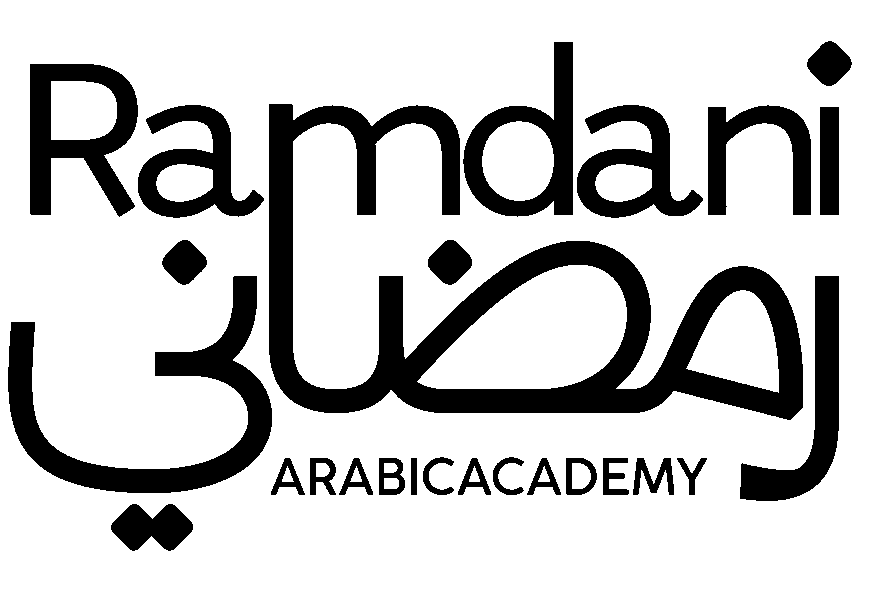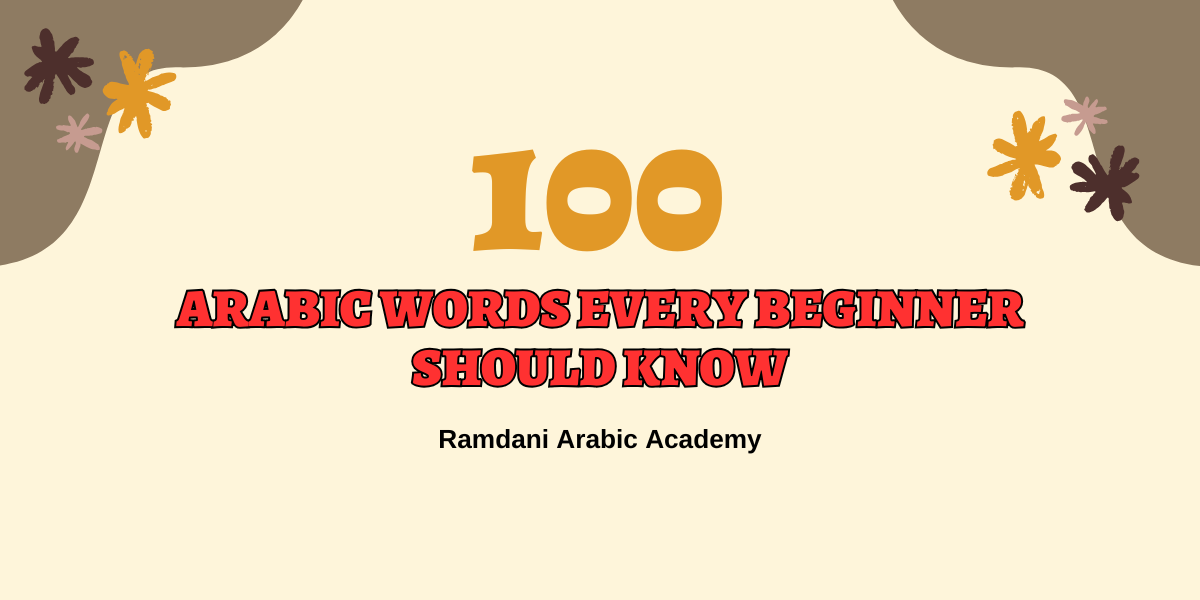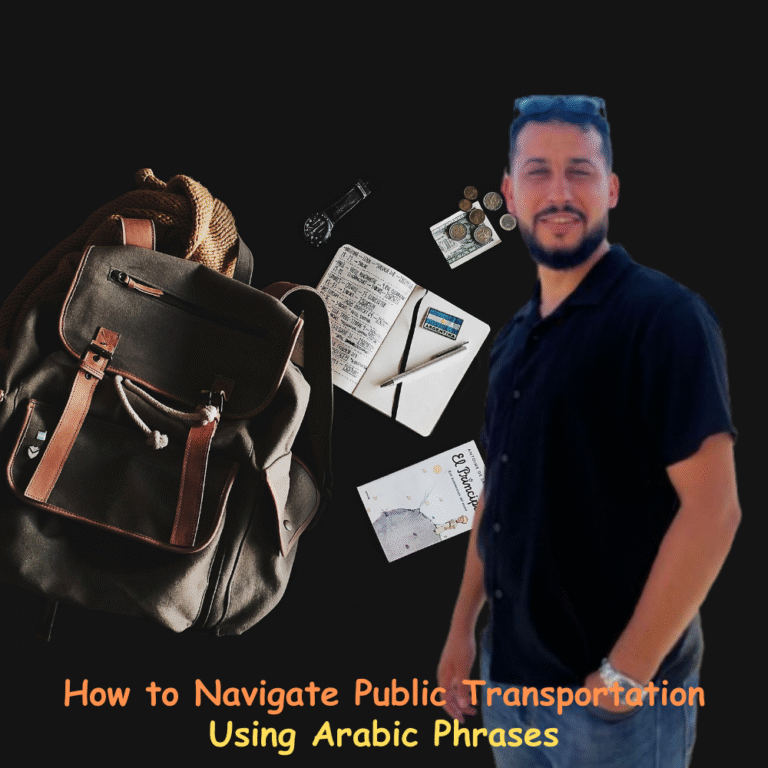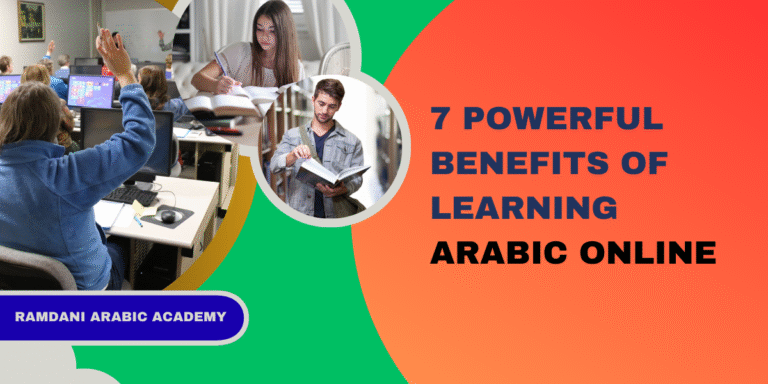100 Arabic Words Every Beginner Should Know
Learning a new language can feel like stepping into a whole new world. Sounds, letters, and words may seem strange at first, but every language has its building blocks. For Arabic learners, starting with the right words can make the journey smoother, faster, and more enjoyable. Arabic is spoken by over 400 million people worldwide. It is the official language of more than 20 countries and is deeply connected to culture, religion, and history. Knowing even a small set of words can open doors to understanding everyday life, communicating with native speakers, and exploring Arabic literature and media.
Every beginner faces the challenge of choosing which words to learn first. Some focus on grammar or sentence structure, while others try to memorize long lists of vocabulary. Both approaches work, but the most practical method is to start with words that are useful in real-life situations. Words that you encounter daily—greetings, numbers, colors, food items, common verbs, and polite expressions—give you a foundation you can build on. Once you feel comfortable with these essentials, expanding your vocabulary becomes easier and more meaningful.
This article presents 100 Arabic words that every beginner should know. These words are carefully selected to cover key areas of communication. They include words for greetings and introductions, basic nouns, verbs you will use frequently, expressions for asking questions, and essential adjectives. Learning these words is not just about memorization. It is about connecting with the language and culture, understanding how native speakers express themselves, and gaining confidence to speak, read, and write in Arabic.
Our goal is to make learning Arabic practical and approachable. Many beginners feel overwhelmed by the script and the sounds, but starting with a manageable set of words allows you to practice pronunciation, remember meanings, and use them in simple conversations. As you progress, you will notice that these basic words appear in sentences, texts, and dialogues, reinforcing your memory naturally. This approach is more effective than rote memorization because it encourages usage and comprehension simultaneously.
At Ramdani Arabic Academy, we believe that language learning should be interactive, structured, and enjoyable. Our online lessons and courses are designed for learners at every level. We provide clear explanations, practical exercises, and cultural insights to make learning Arabic accessible to everyone. By starting with essential words, you create a solid foundation that supports future learning and deepens your understanding of Arabic.
The journey of learning Arabic is rewarding. It challenges you, broadens your horizons, and allows you to connect with millions of speakers around the world. This article will guide you through the first step: mastering 100 words that are essential for every beginner. By the end, you will have a core vocabulary that empowers you to communicate, understand, and enjoy your learning experience.

Part 1: Greetings and Basic Expressions (1–25)
Starting with greetings and common expressions makes it easier to connect with people. These words are used in daily life and form the backbone of polite conversation.
- سلام (Salam) – Peace / Hello
Used as a greeting. Example: Salam! Keif halak? (Hello! How are you?) - مرحبا (Marhaban) – Hello / Welcome
Polite greeting for any time of day. - أهلاً (Ahlan) – Hi / Welcome
Informal, friendly greeting. Often paired with وسهلاً (wa sahlan) to say “Welcome.” - مع السلامة (Ma’a as-salama) – Goodbye
Used when leaving. - إلى اللقاء (Ila al-liqaa) – See you later
Formal way to say goodbye. - نعم (Na’am) – Yes
- لا (La) – No
- من فضلك (Min fadlak/fadlik) – Please
Use fadlak for males, fadlik for females. - شكراً (Shukran) – Thank you
- عفواً (Afwan) – You’re welcome / Excuse me
- آسف (Aasif) – Sorry
Use Aasifa if a female speaker is apologizing. - كيف حالك؟ (Keif halak/halik?) – How are you?
Halak for males, halik for females. - بخير (Bikhair) – Fine / Good
Common response to “How are you?” - ما اسمك؟ (Ma ismuk/ismuki?) – What is your name?
- اسمي … (Ismi …) – My name is …
- من أين أنت؟ (Min ayna anta/anti?) – Where are you from?
- أنا من … (Ana min …) – I am from …
- كم عمرك؟ (Kam ‘umruk/umrik?) – How old are you?
- عمري … (Umri …) – I am … years old
- نعم، قليلاً (Na’am, qalilan) – Yes, a little
Useful for beginners learning to speak Arabic slowly. - لا أفهم (La afham) – I don’t understand
- هل تتكلم الإنجليزية؟ (Hal tatakallam al-inglizia?) – Do you speak English?
- أين؟ (Ayna?) – Where?
Used to ask for directions. - متى؟ (Mata?) – When?
- لماذا؟ (Limatha?) – Why?
These 25 words allow you to greet people, introduce yourself, ask basic questions, and express politeness. Mastering them first gives you confidence to interact in everyday situations and sets the stage for learning more complex vocabulary.

Part 2: Numbers, Days, and Common Nouns (26–50)
Numbers, days of the week, and everyday nouns help you describe time, count items, and identify objects around you. These words are essential for practical communication.
Numbers (26–35)
واحد (Wahid) – One
اثنان (Ithnan) – Two
ثلاثة (Thalatha) – Three
أربعة (Arba’a) – Four
خمسة (Khamsa) – Five
ستة (Sitta) – Six
سبعة (Sab’a) – Seven
ثمانية (Thamaniya) – Eight
تسعة (Tis’a) – Nine
عشرة (Ashara) – Ten
Use numbers when shopping, telling time, or counting objects. Example: لدي ثلاثة كتب (I have three books).
Days of the Week (36–42)
الأحد (Al-Ahad) – Sunday
الإثنين (Al-Ithnayn) – Monday
الثلاثاء (Ath-Thulatha’) – Tuesday
الأربعاء (Al-Arba’a) – Wednesday
الخميس (Al-Khamis) – Thursday
الجمعة (Al-Jum’a) – Friday
السبت (As-Sabt) – Saturday
These words help you discuss schedules, plan meetings, and understand daily routines. Example: سأسافر يوم الثلاثاء (I will travel on Tuesday).
Common Nouns (43–50)
بيت (Bayt) – House / Home
مدرسة (Madrasa) – School
كتاب (Kitab) – Book
قلم (Qalam) – Pen
طعام (Ta’am) – Food
ماء (Ma’a) – Water
صديق (Sadiq) – Friend (male)
صديقة (Sadiqa) – Friend (female)
These nouns are widely used in conversations, reading, and writing. For example: أذهب إلى المدرسة (I go to school) or هذا كتاب جيد (This is a good book).
Learning numbers, days, and these basic nouns gives you tools to describe your environment and daily activities. These 25 words expand your ability to communicate and make it easier to combine vocabulary into simple sentences.

Part 3: Common Verbs (51–75)
Verbs are the backbone of communication. Knowing basic verbs allows you to express actions, intentions, and daily routines. These 25 verbs are essential for beginners to start forming sentences in Arabic.
- يذهب (Yadhhab) – To go
Example: أنا أذهب إلى المدرسة (I go to school) - يأتي (Yati) – To come
Example: هل ستأتي غداً؟ (Will you come tomorrow?) - يفعل (Yaf’al) – To do / To make
Example: ماذا تفعل؟ (What are you doing?) - يأكل (Ya’kul) – To eat
Example: أنا آكل تفاحة (I am eating an apple) - يشرب (Yashrab) – To drink
Example: أريد أن أشرب ماء (I want to drink water) - ينام (Yanam) – To sleep
Example: هو ينام الآن (He is sleeping now) - يقرأ (Yaqra’) – To read
Example: هي تقرأ كتاباً (She is reading a book) - يكتب (Yaktub) – To write
Example: أكتب رسالة (I write a letter) - يشاهد (Yushahid) – To watch / To see
Example: أشاهد التلفاز (I am watching TV) - يسمع (Yasma’) – To listen / To hear
Example: أستمع إلى الموسيقى (I listen to music) - يتحدث (Yatahaddath) – To speak / To talk
Example: هل تتحدث الإنجليزية؟ (Do you speak English?) - يفهم (Yafham) – To understand
Example: أنا لا أفهم (I don’t understand) - يحب (Yuhibb) – To love / To like
Example: أنا أحب القهوة (I like coffee) - يكره (Yakrah) – To hate / To dislike
Example: هو يكره البرد (He hates the cold) - يشتري (Yashtari) – To buy
Example: أريد أن أشتري خبزاً (I want to buy bread) - يبيع (Yabee’) – To sell
Example: هو يبيع الفواكه (He sells fruits) - يسافر (Yusafir) – To travel
Example: نحن نسافر غداً (We are traveling tomorrow) - يعمل (Ya’mal) – To work
Example: أبي يعمل في المكتب (My father works in the office) - يلعب (Yal’ab) – To play
Example: الأطفال يلعبون في الحديقة (The children are playing in the park) - يقابل (Yuqabil) – To meet
Example: سأقابل صديقي بعد الظهر (I will meet my friend in the afternoon) - يسافر (Yusafir) – To travel
Example: هي تسافر إلى القاهرة (She is traveling to Cairo) - يقود (Yaqood) – To drive / To lead
Example: أخي يقود السيارة (My brother drives the car) - يفكر (Yufakkir) – To think
Example: أنا أفكر في المشروع (I am thinking about the project) - يتعلم (Yata’allam) – To learn
Example: أتعلم اللغة العربية (I am learning Arabic) - يشرح (Yashrah) – To explain
Example: المعلم يشرح الدرس (The teacher explains the lesson)
These verbs cover essential daily activities, interactions, and basic communication. Learning them allows you to form simple sentences like أنا أدرس العربية (I study Arabic) or هو يلعب كرة القدم (He plays football). Using verbs regularly in conversation strengthens memory and builds confidence in speaking Arabic.

Part 4: Essential Adjectives and Useful Expressions (76–100)
Adjectives and common expressions help you describe people, objects, and situations. They allow you to communicate more clearly and express opinions.
Adjectives (76–87)
- كبير (Kabir) – Big / Large
Example: البيت كبير (The house is big) - صغير (Saghir) – Small
Example: الكتاب صغير (The book is small) - جيد (Jayyid) – Good
Example: الدرس جيد (The lesson is good) - سيء (Sayyi’) – Bad
Example: الطقس سيء (The weather is bad) - سريع (Saree’) – Fast
Example: السيارة سريعة (The car is fast) - بطيء (Batee’) – Slow
Example: القط بطيء (The cat is slow) - جميل (Jameel) – Beautiful / Nice
Example: المنظر جميل (The view is beautiful) - قبيح (Qabeeh) – Ugly
Example: الكتاب قبيح (The book is ugly) - طويل (Taweel) – Tall / Long
Example: الشجرة طويلة (The tree is tall) - قصير (Qaseer) – Short
Example: الشخص قصير (The person is short) - سعيد (Sa’eed) – Happy
Example: أنا سعيد اليوم (I am happy today) - حزين (Hazin) – Sad
Example: هو حزين الآن (He is sad now)
Useful Expressions (88–100)
- صباح الخير (Sabah al-khair) – Good morning
- مساء الخير (Masa’ al-khair) – Good evening
- تصبح على خير (Tusbah ala khair) – Good night
- مبروك (Mabrouk) – Congratulations
- حسناً (Hasanan) – Okay / Fine
- ربما (Rubama) – Maybe
- بالطبع (Bialtabe’) – Of course
- لا بأس (La bas) – It’s okay / No problem
- ممتاز (Mumtaz) – Excellent / Great
- أنا أحب هذا (Ana uhibbu hatha) – I like this
- أنا لا أحب هذا (Ana la uhibbu hatha) – I don’t like this
- هل يمكنك مساعدتي؟ (Hal yumkinuka musa’adati?) – Can you help me?
- أين الحمام؟ (Ayna al-hammam?) – Where is the bathroom?
These adjectives and expressions complete the set of 100 essential words. They let you describe people, objects, and feelings, respond politely, and handle everyday situations. Mastering these words gives you a strong foundation to start speaking and understanding Arabic naturally.

Taking the First Step in Learning Arabic
Learning Arabic can feel challenging at first. The script looks different, the sounds may seem unfamiliar, and grammar can appear complex. But every learner starts with small, simple steps. Mastering 100 essential words is one of the most effective ways to begin. These words give you a foundation for daily conversations, help you understand basic texts, and make you more confident in speaking. They allow you to greet people, ask questions, describe your surroundings, express feelings, and handle everyday situations.
The key to using these words effectively is practice. Don’t just memorize them. Speak them aloud, write sentences with them, and try to use them in conversations. Pairing words with real-life contexts makes them easier to remember. For example, greet your friends with سلام or مرحبا, ask for directions with أين؟, or describe your feelings with سعيد or حزين. Repetition in real situations turns words into skills.
Another important tip is to combine these words gradually. Start with greetings and expressions, then add nouns, numbers, and verbs. Once you are comfortable, incorporate adjectives and useful phrases. This step-by-step approach helps you build sentences naturally instead of learning words in isolation. Over time, you will notice these basic words appearing in texts, videos, and conversations, reinforcing your memory without extra effort.
At Ramdani Arabic Academy, we understand the challenges beginners face. Our online platform provides lessons, courses, and articles designed specifically for learners worldwide. We focus on practical, real-life Arabic that you can use immediately. Beyond vocabulary, we teach pronunciation, grammar, cultural insights, and interactive exercises. Our goal is to make learning Arabic accessible, structured, and rewarding. By starting with essential words, you gain the confidence to explore more advanced topics without feeling overwhelmed.
Learning a language is not only about words and grammar. It is about connecting with people, understanding cultures, and opening doors to new experiences. Arabic gives you access to over 400 million speakers worldwide, rich literature, media, and traditions. Every word you learn brings you closer to understanding this world.
Finally, remember that patience and consistency are crucial. Progress may feel slow at times, but every word you learn counts. Make a routine, practice daily, and use the words in context. Celebrate small achievements, like successfully greeting someone in Arabic or understanding a sentence in a video. These victories build momentum and keep motivation strong.
As the founder of Ramdani Arabic Academy, I am passionate about helping learners achieve their goals. Our mission is to guide you step by step, from basic words to fluency, and to provide resources that make Arabic practical and enjoyable. Whether you are learning for travel, work, cultural understanding, or personal growth, starting with these 100 essential words is your first step toward success.
Take these words, practice them, and use them every day. Your journey in Arabic begins here, and every effort you make brings you closer to speaking, understanding, and enjoying the language fully. Learning Arabic is a long journey, but it begins with small, consistent steps—and these 100 words are the perfect place to start.







